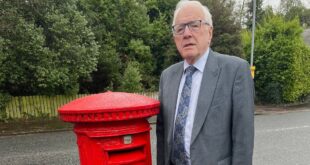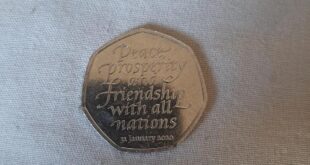With a couple of clicks, it’s now possible to have almost anything delivered to your door — and the pandemic has nudged more of us to shop online.
But while that makes for fewer individual shopping trips, each delivery is the result of a journey that usually comes with an environmental cost.
“Online shopping and deliveries have soared because of the pandemic,” says Elizabeth Fonseca, who is senior air quality manager for the charity Environmental Defense Fund Europe.
“Air pollution is an unintended consequence of this rise, especially since most deliveries happen via diesel fuelled vans that pump dangerous pollutants into the air we breathe.”
When Jayne Cely Cromwell and Juan Cely launched coffee-roasting company Carnival, they were particularly concerned about air pollution. Which is why most afternoons and evenings you’ll find them out on their bikes, delivering coffee from Juan’s family’s farm in Colombia.
“For us it was important to be as environmentally friendly as possible in everything that we do,” explains Cely Cromwell. “We didn’t want to add to emissions by using cars to deliver the coffee.”
The majority of Carnival’s coffee, roasted in small batches in the couple’s garden in Penge, is delivered on two wheels to addresses in south-east London, with orders outside cycling distance going via Royal Mail
“Our customers love the fact that their coffee is delivered by bicycle and I think that’s a big part of it. We always end up having chats as they ask us about the bike,” says Cely Cromwell.
Increase in van pollution
While Carnival keep things largely pedal-powered, many products are delivered by either van or lorry, the majority of which are powered by diesel. In the last 30 years, van traffic has more than doubled in the UK and there has been a 67 per cent increase in greenhouse gas emissions from vans, according to a report by the Department for Transport.
Road traffic is the main source of air pollution in the capital, with diesel vehicles particularly to blame. These emit up to four times more nitrogen oxides (NOx) and 22 times more particulate matter (PM) than a petrol equivalent, according to Transport for London.
Particulate matter, the mixture of extremely small solid particles and liquid droplets found in the air, is the most dangerous form of air pollution to human health. The smallest particles, known as PM2.5, can settle in the airway and get into the bloodstream, causing issues including heart and lung disease. Deliveries contributed 29 per cent of PM2.5 in 2013, despite comprising only 17 per cent of total vehicle kilometres in London, according to a 2019 TfL action plan of measures to encourage people and businesses to choose better delivery options. These include alternatives such as click-and-collect to help reduce the number of vehicles on the road.
According to the TfL plan, freight is also responsible for a third of NOx — nitrogen dioxide and nitric oxide mixed. The impact of NOx on our health is similar to that of particulate matter.
ONE YEAR BREATHING LONDON’S AIR
The Air We Breathe is a year-long project that considers the impact of London’s air on our health and asks how we can take action to limit it.
This project is supported financially by the Children’s Investment Fund Foundation, Guy’s & St Thomas’ Charity, and the Clean Air Fund, who share the project’s aims, but our journalism remains editorially independent.
This project is part of our Future London initiative, which looks for solutions to some of the biggest issues facing the capital.
Dr Gary Fuller, of the London Air Quality Network at Imperial College, says: “Cities make extensive plans and have public transport systems to move people but far less attention is paid to deliveries.” The problem is exacerbated by the fact that 40 per cent of vans are travelling less than a quarter full, according to TfL.
This is a consequence of competition between delivery and logistics companies, Fuller says: “Many companies offer zero-cost home delivery for online purchases but these are not zero cost to our environment. The same is true of the proliferation of hot food deliveries.”
Food delivery apps often rely on mopeds, which can have problematic emissions that are under-regulated in the capital compared with cars.
How e-cargo bikes can help
Among those trying to reduce the environmental impact of deliveries is Pedal Me, a company which uses electric cargo bikes to provide “sustainable delivery and taxi services”.
Pedal Me’s taxi bikes transport two adults or up to four children, while their cargo bikes can carry up to 150kg, with added trailers carrying an additional 150kg. The start-up claims its trips use 90 per cent less CO2 than journeys by vans and taxis.
Ben Knowles, CEO and one of Pedal Me’s co-founders, says: “We see the future of deliveries in cities as being bike-based and then supported by a range of other modes, so rail, barges and HGVs [could bring] goods to distribution sites around London, and the last five miles or so [could be] carried out by e-cargo bike companies such as ourselves linking together strings of jobs.”
Knowles argues that as well as being better for the environment, it could also make deliveries cheaper, as bikes can often move around cities more quickly than cars and vans, and they can access pick-ups and drop-offs more easily, shortening load times.
Consumers can reduce the impact of their deliveries on air quality by choosing suppliers who offer low or no tailpipe emission delivery options, like cargo bikes, notes EDF’s Fonseca. “They can also consolidate their deliveries by ordering items together and choose slower shipping times.”
She adds that people can also urge businesses to stop nudging people toward overnight delivery and provide incentives for slower shipping methods, like Amazon’s “no rush” option.
People can also advocate for policies that support clean delivery vans and lorries and clean air zones, as well as convenient and efficient charging infrastructure. “This is the most powerful step of all,” Fonseca says.
Source link



